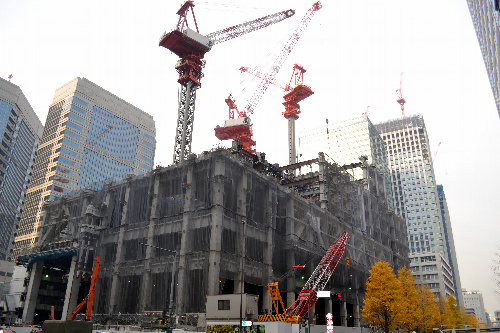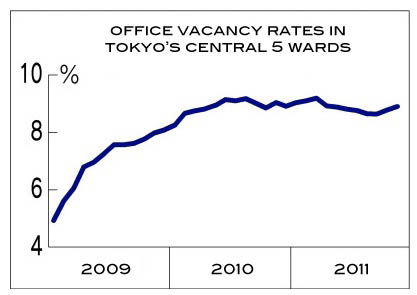The "2012 Problem" of over-supply
 Not only are residential apartments expected to flood the market in 2012, but the supply of new office space is also expected to reach record high levels.
Not only are residential apartments expected to flood the market in 2012, but the supply of new office space is also expected to reach record high levels.
This year, the supply of office space in central Tokyo is expected to reach the third highest level since the bubble economy in the late 1980s. Although construction companies are seeing brisk business, office vacancy rates continue to rise and we are entering into what the real estate industry is calling the "2012 problem". Department stores are facing similar conditions with an oversupply of under-performing branch stores.Read more
Supply of new apartments to increase by 17.6% in 2012
According to the Real Estate Economic Institute, the number of new apartments to hit the market in greater Tokyo next year is forecast to reach 53,000 units. This is an increase of 17.6% from 2011.
This is due to an increase in construction projects as well as the postponement of apartment sales following the March 11 Tohoku disaster.Read more
Secondhand apartment sales down in November
The latest data from REINS has shown that sale contracts on secondhand apartments in the greater Tokyo area for November fell 3.9% from the year before to 2497 units. In Saitama Prefecture, the number of sales fell 0.9% to 342 units, and in Chiba Prefecture sales fell 15% to 300 units.Read more
Apartment rent falls again in November

According to Tokyo Kantei, the average apartment rent in Japan's three largest cities fell again in November.
In greater Tokyo, the average monthly rent fell 0.7% from the previous month to 2533 Yen/sqm. This is the fourth month of continual decline. In Tokyo City, rent fell by 0.6% to 2924 Yen/sqm. Kanagawa Prefecture saw the average monthly rent rise by 1.1% to 2044 Yen/sqm.Read more
Tokyo office market showing further signs of slowing

The central Tokyo office building market is stagnating. At the end of November, the office vacancy rate for Tokyo's central 5 wards (Chiyoda, Chuo, Minato, Shinjuku and Shibuya) reached 8.90%. This is the second continuous month with an increase in vacancy rates and the first time since April, 2011, that rates had reached this level. Meanwhile, the average office rent for central Tokyo has declined for the 39th continuous month.
With the Euro crisis and strong Yen, there is a deceleration in demand from tenants with many companies being more prudent and delaying moving. The demand for buildings with high disaster preparedness and earthquake resistance has slowed.Read more
Is 2012 the time to buy?
Good news for those waiting to buy an apartment. From next year, the inventory of unsold apartments is expected to reach high levels, which could result in more bargain buys.
According to the Real Estate Economic Institute, the sales contract rate for new apartments in September, 2011, had rebounded to 78%. In actuality, that degree of sales may not actually be true. The president of Attractors Lab said that the 'sales contract rate' is not entirely accurate because it does not include apartments that were held back from being released for sale.
In January, 2011, the Institute forecast an inventory of 50,000 apartments for the year. However, this was later reduced to an estimate of 45,000 apartments. The impact of the March 11 Tohoku disaster led many developers to delay apartment sales. By September, the actual supply was down to 28,000 units. Read more
70 - 80 percent drop in rosenka land values in Tohoku

In order to account for changes in land values due to the March 11 Tohoku disaster, Japan's National Tax Agency (NTA) announced adjustment ratios, or scaling factors, for the 2011 rosenka (prices of land fronting major roads). Along with the 1995 Hanshin Earthquake, this is only the second time in history that adjustment ratios have been introduced.Read more
